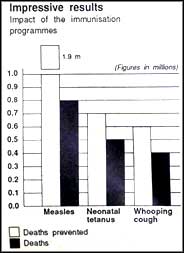Where the twain shall meet
The meeting between the NGOs and the government identified the following key areas for NGO participation:
The meeting between the NGOs and the government identified the following key areas for NGO participation:
This Report is an update of the Rural Food Insecurity Atlas of 2001 released by the M S Swaminathan Research Foundation (MSSRF) and the World Food Programme (WFP). Since then, numerous new programmes have been initiated by the central and state governments for achieving food security in the country.
The Rajiv Gandhi national drinking water mission under the Union rural development ministry has signed an agreement to extend the strategic alliance with the South-Asia water and sanitation programme
<p>It is estimated that more than two-thirds of the population in sub-Saharan Africa (SSA) must leave their home to collect water, putting them at risk for a variety of negative health outcomes. There
The guidelines, compiled by the MUS Group with support from IFAD and SDC, give step-by-step guidance on planning and providing multiple-use water services and on creating an enabling environment at intermediate
The NDA government must have a proactive and positive environment agenda. It must strengthen environmental oversight and not weaken regulations. But it must go beyond clearance of projects to take urgent
Madam Speaker, I rise to present before this august House the Revised Estimates for 2012-13 and a statement of estimated receipts and expenditure for 2013-14. I do so with mixed feelings crossing my mind.
Question raised in Lok Sabha on Socio-Economic Condition of Tribes, 22/07/2019. The overall socio-economic development of the tribal population along with preservation and promotion of traditional tribal
The National Nutrition Survey (NNS) 2011 has reported that 29.7 percent of children in the country are underweight, with some difference between those in the urban area and those in the rural areas.
Question raised in Lok Sabha on Contamination of Ground Water, 01/12/2016. Ground water quality data generated by Central Ground Water Board (CGWB) during various scientific studies and ground water quality
Solid and liquid waste management are becoming issues of great concern in rural India. The changes in consumption patterns including that of people living in rural areas have an impact on the quantity
Sanitation facilities in the rural parts of the Andhra Pradesh state are abysmally poor requiring suitable intervention from non-governmental organistions and private sector, secretary of panchayat
This report, which would jointly prepared by the UN Economic and Social Commission for Asia and the Pacific, the Asian Development Bank and the UN Development Programme, illustrates the negative impacts of the global economic crisis on progress towards the Millennium Development Goals in the Asia-Pacific region and identifies opportunities for action showing how countries can better protect themse

WAR HAS emerged as a major child-killer in the 1980s. Some 1.5 million children died in conflicts; Five million were turned into refugees and another 12 million were rendered homeless. War caused

Pollution kills Europeans than any other factor does. Poor air quality affects crops, ecosystem and children's health; threatens some 700 European species including iconic species such as the
The health and livelihoods of people in rural and peri-urban areas in developing countries is often strongly related to ecosystems services and water supply, sanitation and hygiene (WASH). Although provision of both is integral to water
The World Bank will provide India US $300 million credit for a rural water supply and sanitation programme to Uttar Pradesh over the next six years. An agreement to this effect was signed between the
The World Bank-aided Kerala Rural Water Supply and Sanitation Project is making rapid strides, thanks to the industriousness and initiative of a group of people living here who belong to the four
The National Sample Survey Office (NSSO), Ministry of Statistics and Programme Implementation has released the key indicators of drinking water, sanitation, hygiene and housing condition in India, generated
<p>This Report comes to the conclusion that India’s economic growth <br /> momentum cannot be sustained if urbanisation is not actively facilitated. Nor<br /> can poverty be addressed if the needs of the urban poor are isolated from the<br /> broader challenges of managing urbanisation. Cities will have to become the